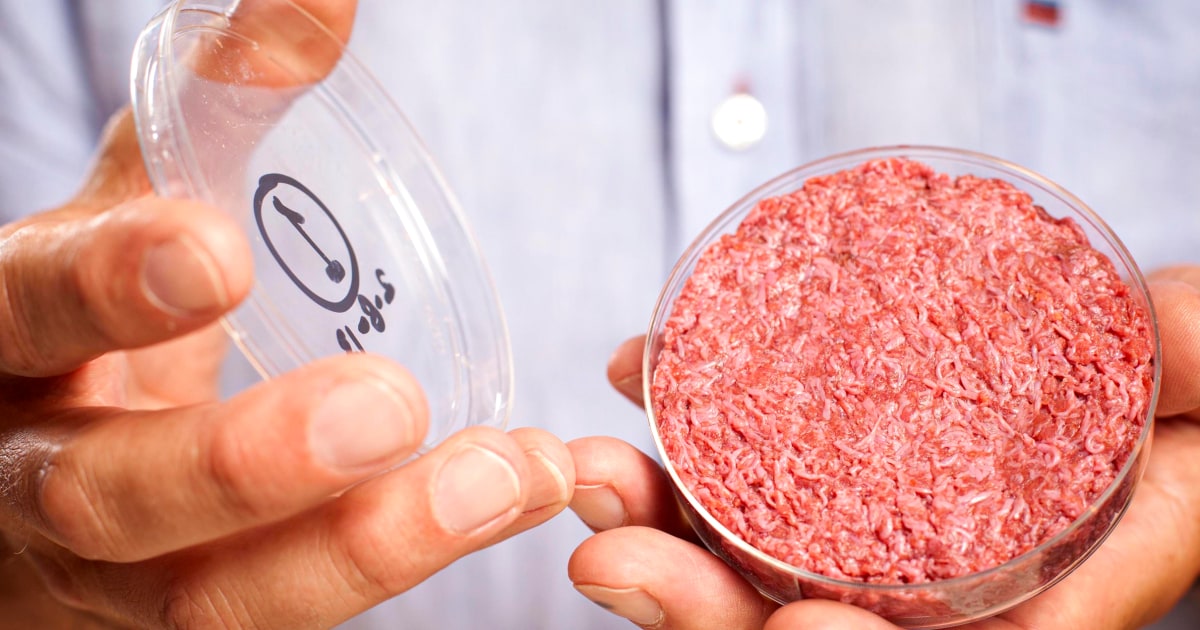Florida Gov. Ron DeSantis signed a bill Wednesday banning and criminalizing the manufacturing and sale of lab-grown meat in the state.
The legislation joins similar efforts in three other states — Alabama, Arizona and Tennessee — that have also sought to stop the sale of lab-grown meat, which is believed to be years away from being commercially viable.
“Florida is fighting against the global elite’s plan to force the world to eat petri dish-grown meat or insects to achieve their authoritarian goals,” DeSantis said. “We will save our beef.”
Lab-grown meat, also known as cultured meat, has attracted considerable attention in recent years as startups have raised millions of dollars to improve technology intended to create a climate-friendly alternative to traditional meat sources . Cultured meat is usually grown in a metal container from a sample of animal cells. They multiply in a container called a bioreactor while being fed water, amino acids, vitamins and lipids – a process that can be difficult to implement on a scale large enough to create enough food for commercial sale.
Still, some companies have made progress, with two California startups receiving approval from U.S. regulators last year to sell lab-grown chicken.
These companies said the Florida bill stifles innovation in a space that is becoming globally competitive.
“The United States currently has a considerable lead in terms of alternative proteins. We have 43 cultured meat companies around the world. But this kind of political rhetoric and these laws put that at risk,” said Tom Rossmeissl, head of global marketing at Eat Just Inc., the company behind cultured meat brand Good Meat.
Upside Foods, another cultured meat production startup, said the ban could endanger the resilience of Florida’s supply chain by hampering the state’s ability to cope with the expected doubling of global protein demand by 2050.
“This type of discriminatory legislation jeopardizes U.S. leadership in biotechnology and allows countries like China to gain an unfair advantage,” Upside Foods said in an email to NBC News.
The main competitor in the cultured meat industry is China, which included the technology in its latest five-year agricultural plan as a way to combat greenhouse gas emissions and avoid food shortages.
Lori Berman, one of ten Democratic senators from Florida who voted against the bill, expressed similar concerns about China. She called the bill “myopic,” viewing cultured meat as a solution to future food shortage problems.
“The beef industry has lobbied against cultured meat, which is why we are now banning an entire industry in our state,” Berman said. “We’re just neglecting an entire industry.”
Dean Black, a cattle rancher and one of the Florida Republican representatives who pushed for the bill’s passage, told NBC News that cultured meat is a national security issue. He fears that the concentration of protein production in factories could lead to famine if those facilities were hit by a missile.
When signing the bill, Florida Agriculture Commissioner Wilton Simpson said the ban was intended to protect “the integrity of American agriculture.”
Advocates say the ban is preventative because cultured meat is still far from competing with regular meat. Good Meat’s product is always more expensive than premium organic meat products. It may be decades before production can be increased to reach price parity.
Paul Shapiro, author of the book “Clean Meat: How Growing Meat Without Animals Will Revolutionize Dinner and the World,” compared the Florida bill to banning video streaming in an attempt to protect successful video stores. Shapiro is the CEO of The Better Meat Co., which makes plant-based “meat” from mushrooms.
“The legislation that has been passed in Florida seeks to kill this industry while we are still in its cradle,” Shapiro said. “Even according to the most optimistic estimates, meat derived from animal cells will not be commercialized in any significant way for five to ten years. »
Good Meat has spent three years working with federal regulators to ensure food safety, but supporters of the ban still have health concerns. Black said more research is needed to assess whether lab-grown meat contains the same micronutrients as real meat.
“Although the FDA has stated that this type of product is safe, that does not mean it is healthy,” Black said. “In Florida, we do not want our citizens to be used as guinea pigs.”
Justin Tupper, president of the United States Cattlemen’s Association, called the bill a “winner” for similar reasons. Although he said he doesn’t fear competition, he is concerned about the chemicals in the new product.
“We don’t want lab-grown meat to undermine our good reputation as the safest and best protein on the planet,” Tupper said.
But Rossmeissl and Shapiro said the health concerns are ill-founded because cultured meat has almost identical nutritional value to real meat. Additionally, conventional meat often contains fecal and intestinal pathogens, as well as antibiotic residue, which must be cooked for safe consumption, Shapiro said.
“With clean meat, you don’t have to worry as much about intestinal pathogens when you’re not growing intestines at all,” Shapiro said.
Rossmeissl added that consumers should be free to choose whether they trust the product.
“It’s not about security. It’s a culture war,” Rossmeissl said.








